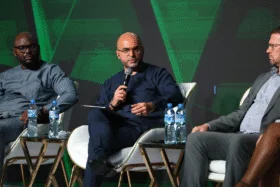MTN Nigeria on Wednesday advocated for regional integration in telecommunications to help lower data and roaming charges, making cross-border communication more seamless and affordable.
Mr Ayham Moussa, the Chief Operating Officer of MTN Nigeria, made the call in Lagos at the Gulf Information Technology Exhibition (GITEX) 2025 conference.

The MTN boss stated that community engagement, state-level investments, and policy harmonization across African countries were key to reducing costs and improving service reliability. He called for stronger collaboration between operators, governments, and communities to address infrastructure challenges and harmonise processes and practices to advance telecommunications service delivery across Africa.
Moussa said the company currently operates about 40,000 km of fibre lines across the continent, but that vandalism and poor protection of critical infrastructure continue to undermine connectivity and service quality.
Moussa noted that 70 per cent of its network downtime was linked to power supply issues, while over 1,700 fibre cuts were recorded in the last six months.
Moussa stressed the critical need for robust infrastructure and advanced connectivity solutions to unlock Africa’s full digital potential.
He added that education and awareness are crucial in reducing fibre cuts and promoting the protection of critical national infrastructure.
“We are at a pivotal moment in Africa’s digital journey as the demand for connectivity is skyrocketing, and we, as industry leaders, have a collective responsibility to ensure that this demand is met with resilient, scalable, and accessible infrastructure.
“Our focus at MTN is not just about expanding networks; it’s about building the foundational highways for digital inclusion and economic growth across the continent.
“We are working closely with the Nigerian Communications Commission (NCC) and other stakeholders to promote awareness, protect infrastructure and strengthen power support for telecom sites.
“We can move into harmonising the processes and practices between the states and the whole country that will allow us to employ faster and cheaper and consequently reflect that in the future,” Moussa added.



